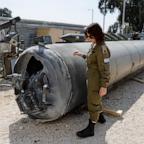Burned By Meteorites: Beware Rock-Bottom Bargains
Today's meteror can be tomorrow's (star) dust.
Feb. 19, 2013 -- Meteorite hunters are converging on Chelyabinsk, Russia, seeking pieces of a space rock that exploded above that city last week, injuring 1,200 people. Even small fragments, they say, could be worth thousands of dollars.
Want one? Experts on buying, selling and collecting interstellar rocks advise caution. You can be hoodwinked by unscrupulous meteorite dealers. Worse, you can buy a bona fide meteorite, and, by failing to show it proper care, see it disintegrate into stardust before your very eyes.
"The consumer needs to understand that these rocks come from space," says Eric Twelker, founder and proprietor of The Meteorite Market, oldest such marketplace on the Internet. "Many are unstable on Earth. If you put your space rock on your coffee table, it may disintegrate or rust."
On Earth some meteorites are more unstable than others, he says. One variety, found in China, "just rusts into a pile of oozing mush." Another, from Kansas, sports beautiful crystals; but it, too, may rust and the crystals pop out.
How do you know if what you're buying is really a meteorite? You don't, says Twelker. All you have to go on, as an amateur, is the reputation of the seller.
The market for meteorites, he says, "is a bit like the Wild West." His fellow dealers he calls "a bunch of pirates." No independent authority guarantees a space rock's authenticity. Whereas the gem industry has laboratories like the Gem Institute of America that will examine and certify a gem, there's nothing comparable to that for meteorites.
"The certificates you get?" says Twelker. "They're just pieces of paper"—an attestation by a dealer that a meteorite is real. But the market is replete with unscrupulous dealers, he warns. "You can buy a rock from some guy's driveway if you're not careful." According to him, eBay is "a good place" to get stuck with a driveway rock. "I have a very low opinion of eBay," he says.
For legitimate meteorites, a variety of factors determine price, starting with supply and demand.
Twelker's site has one group of meteorites that go for $1.50 each with every order of $20 or more. The reason for the rock-bottom price? "There's a huge supply of them—probably thousands of tons" from a deposit in northwest Africa.
"What's hot" also determines price. For example, the Russian meteorite right now is hot. Asked if any genuine fragments of it have come to market yet, Twelker replies, "None that I'm aware of. But I'm keeping track. There's been some dirt from the area on eBay; but whether or not it's real is the next question." He prefers not to buy hot stuff. "It's too easy to get burned," he warns. "First-blush stuff I tend to steer away from."
In Photos: Meteorite Crashes in Russia
Finally, in estimating price, there's the issue of whether anybody saw the meteorite fall. A so-called "witnessed fall" makes a meteorite more valuable to academic and institutional buyers, who like specimens with as little weathering as possible, Twelker explains. A meteorite whose fall was recently observed is known to be fresh.
Academic and institutional buyers account for about one third of all buyers, according to Twelker. The rest of the market is divided between serious collectors and novelty-seekers—people who want a meteorite to put on their coffee table, say, or to give as a birthday present.
As for sellers, they are distributed all over the world. Twelker buys from sellers in Africa, Russia, Australia and Canada.
The size of the entire market for meteorites, he says, is hard to estimate; but it's tiny in comparison, say, to the market for stamp-collecting.




